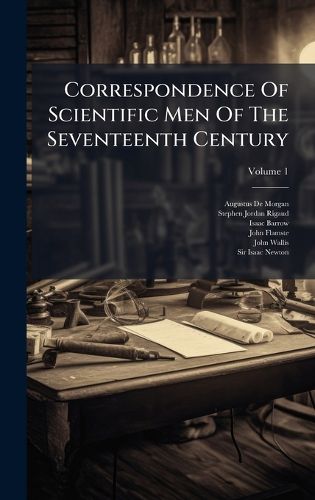Readings Newsletter
Become a Readings Member to make your shopping experience even easier.
Sign in or sign up for free!
You’re not far away from qualifying for FREE standard shipping within Australia
You’ve qualified for FREE standard shipping within Australia
The cart is loading…






Correspondence of Scientific Men of the Seventeenth Century, Volume 1, offers a fascinating glimpse into the intellectual world of the era through the personal letters of some of its most prominent figures. This collection includes correspondence from Isaac Barrow, John Flamsteed, John Wallis, and Sir Isaac Newton, among others.
Printed from the original documents in the collection of the Earl of Macclesfield, these letters provide invaluable insights into the development of scientific thought and the personal relationships between these influential thinkers. Edited by Augustus De Morgan and Stephen Jordan Rigaud, this volume captures the spirit of scientific inquiry that defined the 17th century and remains a valuable resource for historians of science and anyone interested in the lives and works of these seminal figures.
This work has been selected by scholars as being culturally important, and is part of the knowledge base of civilization as we know it. This work was reproduced from the original artifact, and remains as true to the original work as possible. Therefore, you will see the original copyright references, library stamps (as most of these works have been housed in our most important libraries around the world), and other notations in the work.
This work is in the public domain in the United States of America, and possibly other nations. Within the United States, you may freely copy and distribute this work, as no entity (individual or corporate) has a copyright on the body of the work.
As a reproduction of a historical artifact, this work may contain missing or blurred pages, poor pictures, errant marks, etc. Scholars believe, and we concur, that this work is important enough to be preserved, reproduced, and made generally available to the public. We appreciate your support of the preservation process, and thank you for being an important part of keeping this knowledge alive and relevant.
$9.00 standard shipping within Australia
FREE standard shipping within Australia for orders over $100.00
Express & International shipping calculated at checkout
Correspondence of Scientific Men of the Seventeenth Century, Volume 1, offers a fascinating glimpse into the intellectual world of the era through the personal letters of some of its most prominent figures. This collection includes correspondence from Isaac Barrow, John Flamsteed, John Wallis, and Sir Isaac Newton, among others.
Printed from the original documents in the collection of the Earl of Macclesfield, these letters provide invaluable insights into the development of scientific thought and the personal relationships between these influential thinkers. Edited by Augustus De Morgan and Stephen Jordan Rigaud, this volume captures the spirit of scientific inquiry that defined the 17th century and remains a valuable resource for historians of science and anyone interested in the lives and works of these seminal figures.
This work has been selected by scholars as being culturally important, and is part of the knowledge base of civilization as we know it. This work was reproduced from the original artifact, and remains as true to the original work as possible. Therefore, you will see the original copyright references, library stamps (as most of these works have been housed in our most important libraries around the world), and other notations in the work.
This work is in the public domain in the United States of America, and possibly other nations. Within the United States, you may freely copy and distribute this work, as no entity (individual or corporate) has a copyright on the body of the work.
As a reproduction of a historical artifact, this work may contain missing or blurred pages, poor pictures, errant marks, etc. Scholars believe, and we concur, that this work is important enough to be preserved, reproduced, and made generally available to the public. We appreciate your support of the preservation process, and thank you for being an important part of keeping this knowledge alive and relevant.